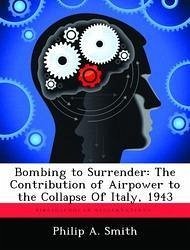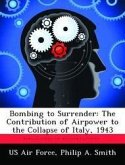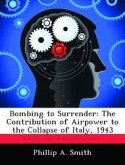Throughout this first century of airpower, military theorists have proposed numerous schemes as the best use of airpower. Airmen of many nations tried and tested these theories in wars large and small, and they have learned, ignored, or forgotten many lessons. Of the four major coercive mechanisms available to airpower--punishment, risk, military denial, and decapitation--Robert Pape in Bombing to Win: Air Power and Coercion in War concludes that military denial is the best use of airpower. Furthermore, Pape argues that recent technological advances only enhance the military denial mechanism. In his appendix, Pape categorizes the Italian example as another case of successful military denial. This study examines the collapse of Italy in 1943 and the contribution of airpower to this collapse. Several broad works, often citing Ernest R. May in "Lessons" of the Past: The Use and Misuse of History in American Foreign Policy, claim that airpower decisively caused the Italian surrender, but do not indisputably argue this point nor do they define the coercive mechanism(s) airpower employed to achieve this result. Studies such as the United States Strategic Bombing Survey or that of the British Bombing Survey Unit largely ignore Italy or in the case of Franklin William Deakin's The Brutal Friendship cite coalition politics as the primary cause of Italy's surrender. This study reveals how airpower made four contributions to the collapse of Italy. First, airpower shaped the grand strategy of the western Allied powers in 1943. The Americans preferred to wage an air campaign to destroy German industry while using the direct approach of a cross-channel invasion to defeat Germany.








